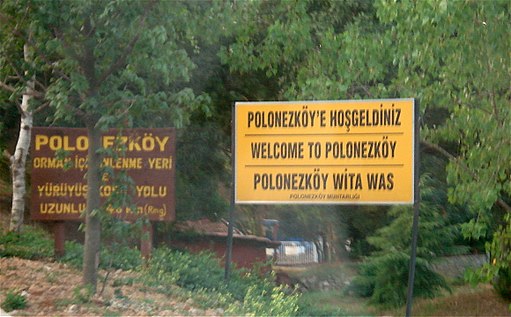There are times when Istanbul can be too much, at least for a country girl like me. Especially in the summer, as the sticky heat calls for wide-open windows, the constant hum and periodic bursts of noise that define this city – buses and cars honking, people yelling, cats crying, dogs barking, the Aygaz truck with its annoyingly catchy tune that never fails to get stuck in my head – are especially pronounced.

Short of a full-blown vacation, the next best option is a day trip outside of the city. Although it may seem like the concrete jungle will never end, there are a few pockets of green space left in Istanbul and its environs. Polonezköy, a small village on the Asian side, is one such place. With multiple picnic areas, shaded forest trails and boar sucuk to boot, Polonezköy is a place for any city-dweller to kick back and enjoy the sights and sounds of nature that are all too often dwarfed by the urban landscape.
Polonezköy, which translates to “Polish village”, was originally settled by Polish immigrants in 1842. During the Ottoman period there were rich and diverse forms of contact between Poland-Lithuania and the Ottomans, especially from the early sixteenth century to the late eighteenth century, during which time they shared a direct border. These relations remained quite good even after Poland was partitioned between Austria, Russia and Poland in 1795, with the Ottomans maintaining a “Polish Ambassador” in Istanbul until the end of the First World War and the subsequent formation of a Polish state.
With such close relations, it is no wonder that Prince Adam Jerzy Czartoryski, the Chairman of the Polish National Uprising Government and the leader of a political emigration party, founded Polonezköy (originally called Adamköy in Ottoman Turkish and Adampol in Polish, which both translate to “Town of Adam”) with the intention of building an emigration center. Even though the town was at first sparsely populated, it swelled with Polish emigrants during the Crimean War in 1853 and sheltered Poles escaping from captivity in Russia throughout the late nineteenth century. A large number of residents returned to Poland after the independent state was established in 1918, while the remaining inhabitants took Turkish citizenship in 1938.
There is little of Polonezköy’s past that remains today – there is a church in the center of town, and it is said that some of the older generation still speak Polish fluently, although they are dwindling in number. Yet this small village in the middle of a large tract of forest still acts a refuge of sorts, although of a very different kind. The remoteness of Polonezköy, amplified by the narrow and winding roads leading up to it, is a major draw for anyone seeking an escape from the city.
It is the haven-like quality of Polonezköy that I find so appealing. It feels like an adventure getting there – traveling roads deep into the woods – and once you arrive, you quickly see that Polonezköy is well worth the effort.
Getting there and back: Polonezköy is not accessible by public transport. A taxi from Beşiktaş costs approx. 50 TL one way. There are no taxi stands in Polonezköy, so it is best to arrange a deal with a taxi driver beforehand. It is also possible to arrange for a taxi from Kavacık, the closest transportation hub.
[geo_mashup_map]












Emma, I too am a “country girl” struggling with the commotion of Istanbul. Thanks for the tip on a green place. Where are you from?
Hi Dale, thanks for reading, Polonezkoy really is a great place to take a break from the city. I’m originally from Maine, how about yourself?
[…] https://yabangee.com/2013/08/green-getaway-polonezkoy/ […]
[…] not averse to steep hills, it’s still possible to find quiet corners for a walk or a bike ride. Polonezkoy is also worth a visit for some green respite. It’s only accessible by car or taxi but well […]
[…] Go green! We know Istanbul doesn’t have a lot of green space. (Didn’t a bunch of people, like, protest […]